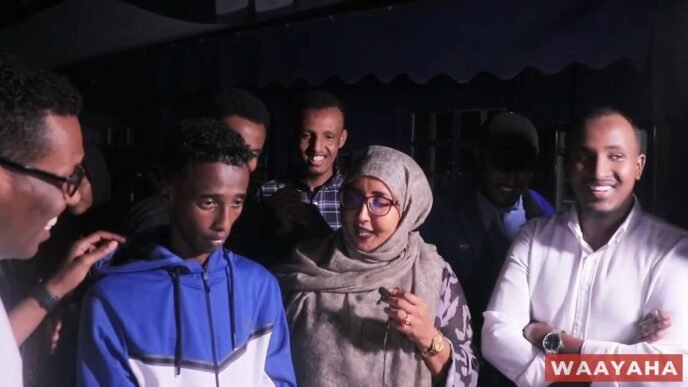In a significant diplomatic move, Somalia and Tanzania recently inked a series of wide-ranging agreements aimed at deepening their bilateral cooperation across multiple fronts. The pacts, signed during a high-level Tanzanian delegation’s visit to Mogadishu, mark a new chapter in the two nations’ relations and hold profound implications for their future engagements.
The Visiting Delegation: A Powerful Contingent
The Tanzanian delegation that arrived in Somalia’s capital was a formidable one, comprising over 40 high-ranking officials from various government ministries and departments. The group included representatives from up to five different ministries, as well as top brass from the country’s intelligence, military, and security forces. This diverse composition underscored the comprehensive nature of the agreements and Tanzania’s commitment to strengthening ties with its East African neighbor.
Scope of the Agreements: A Comprehensive Blueprint
The agreements covered a broad spectrum of areas, reflecting the two nations’ desire to foster collaboration on multiple fronts. Among the key pacts signed were:
1. General Cooperation Agreement: Serving as the overarching framework, this agreement laid the groundwork for enhanced cooperation across various sectors.
2. Defense Agreement: Recognizing the importance of regional security, this pact aimed to bolster defense cooperation between the two countries.
3. Security Agreement: Addressing shared security concerns, this agreement focused on strengthening measures to combat threats such as terrorism and transnational crimes.
4. Healthcare Agreement: Acknowledging the significance of public health, this pact sought to facilitate knowledge-sharing and cooperation in the healthcare sector.
5. Aviation Agreement: Aimed at enhancing air connectivity and facilitating travel between the two nations, this agreement addressed aviation-related matters.
6. Education Agreement: With a focus on capacity-building, Tanzania pledged to provide scholarships to Somali students at various academic levels, including bachelor’s, master’s, and doctoral programs.
7. Prisoner Transfer Agreement: Facilitating the transfer of prisoners between the two countries, this agreement aimed to streamline legal processes and enhance cooperation in the judicial sphere.
8. State-Building and Governance: Recognizing Tanzania’s long-standing experience as an independent nation, this aspect of the agreements sought to leverage Tanzania’s expertise in state-building and governance to support Somalia’s ongoing nation-building efforts.
Strategic Implications: A Multifaceted Partnership
The agreements hold significant strategic implications for both countries. For Somalia, still recovering from decades of civil strife and state fragmentation, the pacts represent a vital opportunity to tap into Tanzania’s wealth of experience and knowledge in various domains.
Ambassador Ahmed Isse Awad, Somalia’s Minister of Foreign Affairs and International Cooperation, highlighted the importance of the agreements, stating, “These agreements open doors for further cooperation and lay the foundation for addressing any challenges or opportunities that may arise between our two nations.”
On the defense and security fronts, the agreements pave the way for enhanced intelligence-sharing, joint training exercises, and capacity-building initiatives. This cooperation is crucial in combating the threats posed by terrorist groups and transnational criminal networks operating in the region.
In the realm of healthcare, the agreements facilitate knowledge-sharing and access to Tanzania’s well-established healthcare infrastructure. This collaboration holds the potential to bolster Somalia’s efforts in improving public health outcomes and enhancing its medical capabilities.
The education agreement, which provides scholarships for Somali students, is a testament to the two nations’ commitment to investing in human capital development. By enabling access to quality education, the agreement aims to nurture the next generation of Somali leaders, professionals, and experts who will play pivotal roles in the country’s ongoing reconstruction and development efforts.
Moreover, the agreements encompass areas such as aviation, facilitating air connectivity and fostering economic ties through enhanced trade and investment opportunities.
Challenges and Opportunities Ahead
While the agreements represent a significant milestone, their successful implementation will require sustained commitment and effort from both sides. Overcoming logistical hurdles, ensuring effective coordination, and allocating adequate resources will be crucial to realizing the full potential of these pacts.
Additionally, fostering mutual trust, understanding, and respect for each nation’s sovereignty and cultural values will be essential in navigating the complexities of this multifaceted partnership.
Nonetheless, the agreements between Somalia and Tanzania exemplify the power of regional cooperation and the shared aspiration for peace, stability, and prosperity in East Africa. As the two nations embark on this journey of deepened collaboration, the international community will closely observe the outcomes, which could serve as a model for other regional partnerships.
In conclusion, the comprehensive agreements signed between Somalia and Tanzania mark a significant step forward in their bilateral relations. By leveraging each other’s strengths and experiences, the two nations have laid the groundwork for a multidimensional partnership that holds the potential to catalyze positive transformations in various spheres, from security and healthcare to education and state-building.











